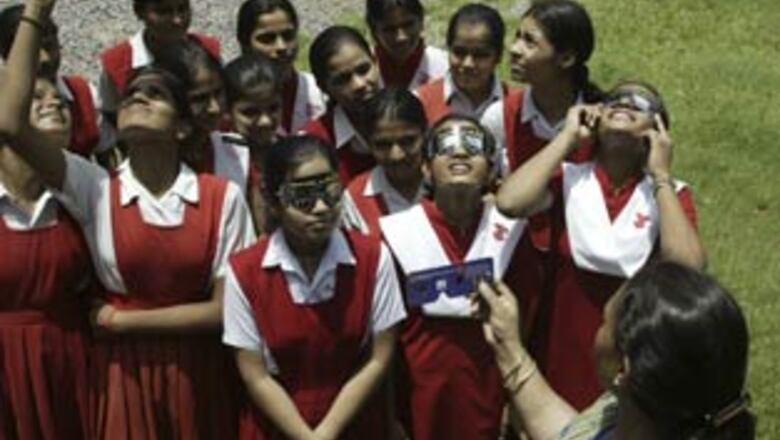
views
New Delhi/Taregna/Surat: The wait to witness a once-in-a-lifetime celestial phenomenon ends at dawn on Wednesday when an eclipsed sun rises over the horizon.
Tens of thousands of people all over India are getting ready to wake up to a shaded sunrise and gather at rooftops, planetariums and parks to watch the century's longest total solar eclipse.
The total eclipse, which starts at sunrise in Surat in Gujarat, is expected to last six minutes and 44 seconds, making it the longest till 2132.
The total solar eclipse has brought Bihar's nondescript village, Taregna, into the limelight with scientists, sky gazers and tourists from across the world making a beeline to watch the celestial spectacle.
The phenomenon will be best glimpsed from Taregna, which is suddenly boasting temporary toilets, repaired roads and uninterrupted electricity supply to cater to its many visitors from India and abroad.
"We have been waiting for days, now we want it (the solar eclipse) to happen soon," said Dhananjay Singh, a teacher in a private school who has been asking his students not to miss the event.
Delhi will witness 85 per cent of the eclipse. It begins at 0530 hours IST and ends at 0720 hours IST, lasting for an hour and 50 minutes.
"I am really excited about the event. I have already bought a pair of solar glasses from Nehru Planetarium and will watch the total solar eclipse on Wednesday morning," said Rahul Singh, a student of Class 12.
Many people have also decided to visit the Nehru Planetarium which is organising a public sky watch.
"It is once in a lifetime opportunity and I cannot miss it at any cost. I along with my wife and daughter will visit Nehru Planetarium sharp at 0530 hours IST to see all the phases of the solar eclipse," said 65-year-old SN Mitra.
In Surat, where it begins, the solar eclipse begins at 0528 hours IST when the shadow of the moon touches the earth at local sunrise at a point in the Arabian Sea close to the western coast of India. The eclipse ends at 1042 hours IST when the moon's shadow finally leaves the earth at local sunset at a point in the south Pacific ocean.
PAGE_BREAK
At 0623 hours IST, the central path of the eclipse will touch the earth at sunrise at a point in the Gulf of Khmbhat in the Arabian sea near the southern coast of Gujarat. At this time, the path of totality will be about three minutes 30 seconds.
"People in Delhi will not be able to watch the totality phase of the eclipse. The greatest phase will be around 0625 hours IST when 85 per cent of diameter of the sun will be eclipsed," Director of Nehru Planetarium N Rathnashree said.
To facilitate people to watch the solar eclipse through the safest possible ways, various scientific groups in the Capital are organising public skywatches on Wednesday morning.
Nehru Planetarium, in collaboration with the Amateur Astronomers Association, Delhi and Science Popularisation Association of Communication and Educators (SPACE) will be conducting a public skywatch for the eclipse.
A group of 50 people will leave for Gaya in Bihar in a chartered flight from Delhi to chase the eclipse above the clouds at a height of 41,000 feet. The flight has been organised by SPACE.
"We are organising several trips to totality locations for people to watch the eclipse. Believe me people are so excited that they are ready to travel several kilometres from here to have a better view of the eclipse," President of SPACE Chander Bhushan Devgun said.
During the eclipse, the shadow of the moon will be so large that even at sunrise, the duration of totality phase will be over three minutes. The shadow very quickly moves across the breadth of India towards Arunachal Pradesh.
It spans a third of the entire path in India, 900 km out of 2,500 km.



















Comments
0 comment